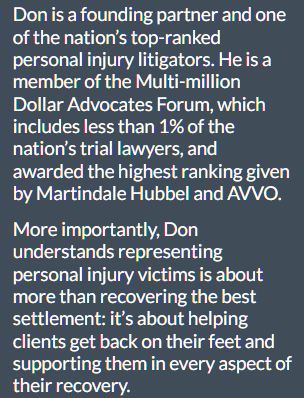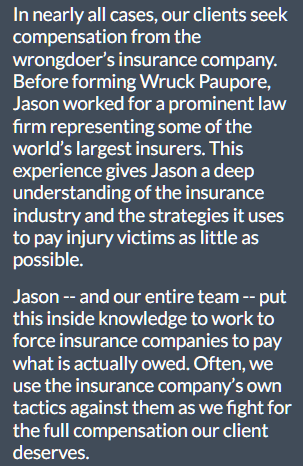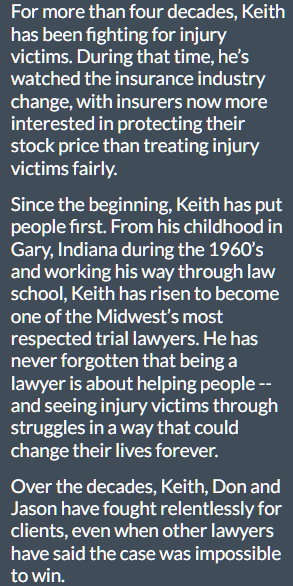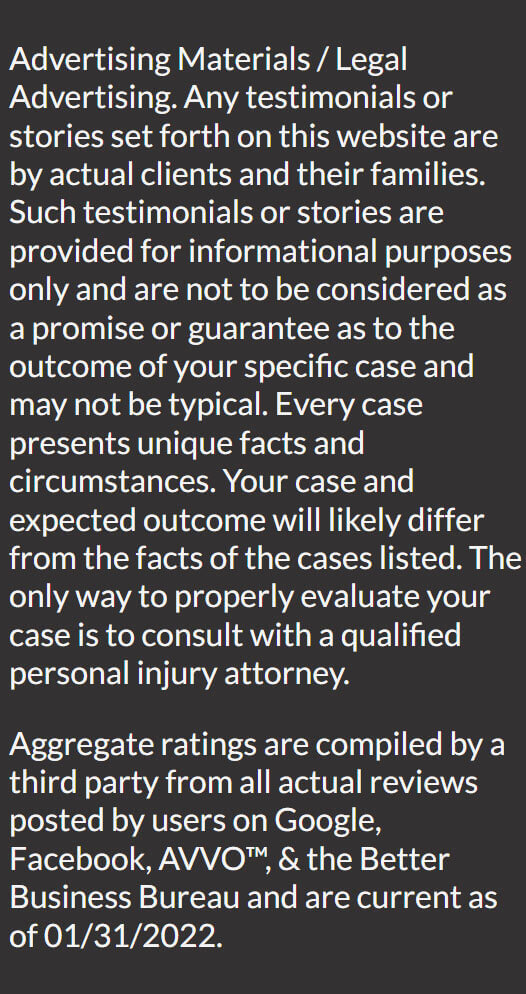



Few things are more difficult than dealing with the untimely death of a loved one. Many states have created unique paths for grieving families to seek monetary compensation to make the grieving process just a little more comfortable.
Wrongful death actions are available in most states where the death resulted from negligent or intentionally harmful behavior. However, there are significant differences among the states in areas like who can bring the lawsuit, how long they have to act, and how compensation is calculated and distributed.
Wruck Paupore Injury Lawyers represent the families of wrongful death victims throughout Indiana, Wisconsin, and Illinois and consults on cases throughout the country. Contact one of our wrongful death lawyers today at (219) 322-1166 for a free initial case assessment to understand the value of your case and protect your financial future.
Under Indiana law, a wrongful death is one that was caused by the “wrongful act or omission” of another person or entity. This could be a negligence-based situation, such as a car accident, medical malpractice, or an intentional act like a violent crime.
Regardless of the circumstances, a wrongful death lawsuit should not be confused with a criminal prosecution on the same issue. Criminal cases must be proven “beyond a reasonable doubt” and, if successful, result in fines and jail time. Wrongful death lawsuits are civil actions and directly benefit the deceased’s estate and family members. They also require a much lower burden of proof. We would strongly suggest that you discuss your potential wrongful death case with an attorney, even if there is already an ongoing criminal case on the same matter.
Indiana law distinguishes between wrongful deaths of children and adults when it comes to wrongful death lawsuit damages.
For the wrongful death of a child in Indiana, damages may include the loss of the child’s love and companionship, the expenses associated with the child’s medical care, funeral costs and estate administration, and the cost of counseling for grieving family members.
For wrongful death lawsuits that arise out of the death of an adult, the law makes further distinctions based on whether the adult was married or had surviving children or dependents. Suppose the deceased was married or had dependents. In that case, the surviving family can recover for the loss of the deceased’s future earnings and their care and guidance, in addition to the loss of love and companionship and medical and funeral costs.
For unmarried adults who died without dependents, damages for the loss of love and companionship are capped at $300,000, and compensation for future earnings will not be available.
Every state has its own statute of limitations, which governs the time limit for filing a particular type of civil action. For wrongful death lawsuits, Indiana’s personal injury statute of limitations requires that the person bringing the lawsuit file less than two years after the date of the death in question. Failing to meet this deadline will likely result in your case being discarded. Avoid missing your deadline by reaching out to an Indiana wrongful death lawyer as soon as possible.
The best way to determine whether you may have a viable wrongful death lawsuit on your hands is to think about the situation like a personal injury claim. If the deceased would have had a valid personal injury lawsuit had they survived the incident, you likely have a wrongful death claim.
Illinois allows courts to award compensation to the deceased's immediate family members for their loss of financial support, companionship, instruction, education, and guidance. Additionally, you could also recover compensation for medical and funeral expenses, as well as the pain and suffering associated with the untimely loss. Illinois law does not use any caps on the amount of damages a plaintiff could recover in a wrongful death lawsuit.
Illinois’ statute of limitations for wrongful death lawsuits is complicated. Generally, the civil action must be brought within two years of the date of the death in question, and the personal representative (or “executor”) of the deceased’s estate must be the one to file the claim. If the deceased did not name an executor in their will, a court might appoint one for them.
However, if the death was caused by “violent intentional conduct,” the time limit extends to five years. If the defendant was charged with first- or second-degree murder, intentional or reckless homicide, or manslaughter, the claim may be brought any time within one year of the completion of the case, regardless of how the defendant pled to the charges or whether the defendant was found guilty or not guilty.
Regardless of which time limit applies to your case, failing to file before the time limit expires will almost certainly bar you from recovery. If you have questions about how long you have to file your claim, reach out to one of our Illinois wrongful death attorneys.
Wrongful death lawsuits arise under the same circumstances in Wisconsin as in Indiana and Illinois. However, the way courts approach the award of damages and the time limit in which you must file is differently. It is important that you discuss these differences with your Wisconsin wrongful death lawyer so that you are not caught by surprise during the process.
Wisconsin law sets out the order of who can file a wrongful death lawsuit as listed below:
In any case, the executor of the deceased’s estate may file the lawsuit on behalf of all parties. If the deceased left behind a child under the age of 18, the court will put aside a portion of the total damages for the care of all children that fit the description. The amount will be determined based on the age and needs of the children and the abilities of other surviving caregivers but will never exceed 50% of the total damages awarded.
Wisconsin’s statute of limitations distinguishes wrongful death lawsuits that arise from car accidents from all other wrongful deaths. Generally, the applicable time limit for filing the wrongful death action is three years, but for car accidents, the case must be filed within two years of the date of death.
To get a free initial case assessment on your case, call the wrongful death attorneys at Wruck Paupore today at (219) 322-1166 and we will work to answer your questions and help you protect your rights.
Don is a founding partner and one of the nation’s top-ranked personal injury litigators. He is a member of the Multi-million Dollar Advocates Forum, which includes less than 1% of the nation’s trial lawyers, and awarded the highest ranking given by Martindale Hubbel and AVVO.
More importantly, Don understands representing personal injury victims is about more than recovering the best settlement: it’s about helping clients get back on their feet and supporting them in every aspect of their recovery.

In nearly all cases, our clients seek compensation from the wrongdoer’s insurance company. Before forming Wruck Paupore, Jason worked for a prominent law firm representing some of the world’s largest insurers. This experience gives Jason a deep understanding of the insurance industry and the strategies it uses to pay injury victims as little as possible.
Jason -- and our entire team -- put this inside knowledge to work to force insurance companies to pay what is actually owed. Often, we use the insurance company’s own tactics against them as we fight for the full compensation our client deserves.

For more than four decades, Keith has been fighting for injury victims. During that time, he’s watched the insurance industry change, with insurers now more interested in protecting their stock price than treating injury victims fairly.
Since the beginning, Keith has put people first. From his childhood in Gary, Indiana during the 1960’s and working his way through law school, Keith has risen to become one of the Midwest’s most respected trial lawyers. He has never forgotten that being a lawyer is about helping people -- and seeing injury victims through struggles in a way that could change their lives forever.
Over the decades, Keith, Don and Jason have fought relentlessly for clients, even when other lawyers have said the case was impossible to win.


© 2025
Terms of Service | Privacy Policy | Resources | Blog | Sitemap

© 2022 Wruck Paupore PC
Terms of Service | Privacy Policy